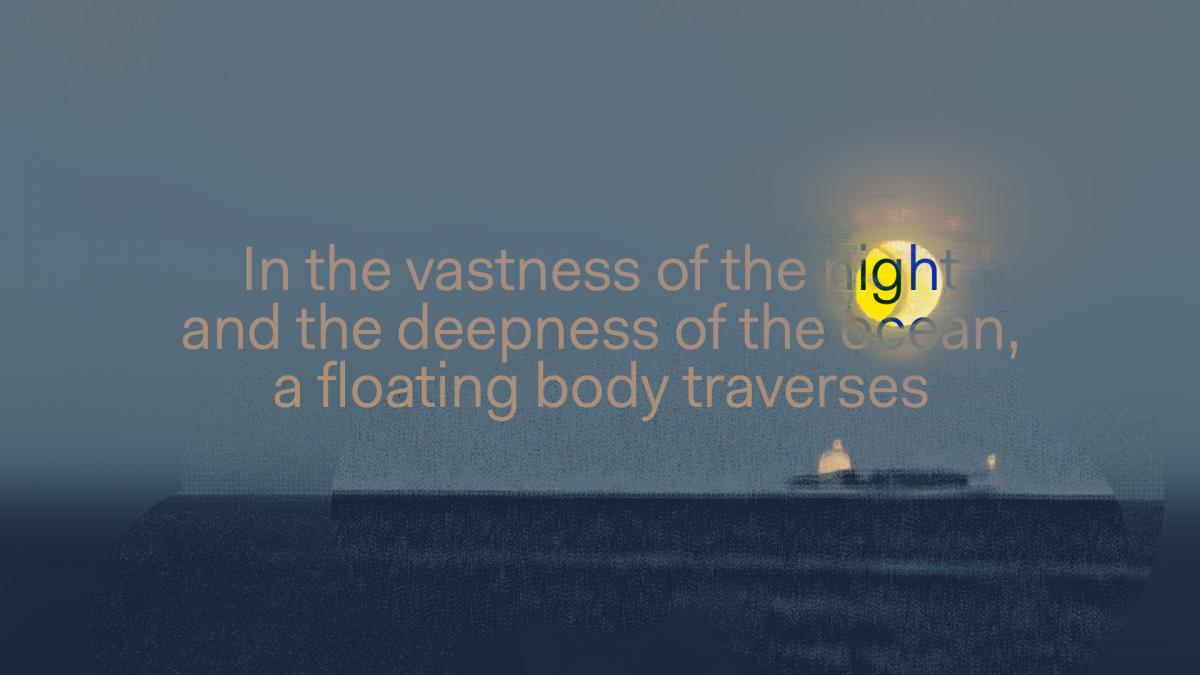Night Boats: The case of Golden Princess
Toni Brell and Angeliki Tzortzakaki will tell stories of socio-geo-ecological entanglements through the fictionalised setting of a night boat, inspired by the multilayered history of the Finlandia cruise ship that between 1975 and 1988 sailed around the Baltic Sea under different identities. Wrapped into the format of a ghost sea-vessel story, they will research and speak about the changing landscapes and scenarios that we are haunted by due to a perennial planetary crisis. Brell and Tzortzakaki are artists-in-residence of Research Pavilion #5.

The night boat project
In the vastness of the night and the deepness of the ocean, a floating body traverses. Slow but steady, accompanied by the lingering hum of its engine. This body-vessel is unlike any other boat: it’s an obscure mechanic configuration whose destination is uncertain and can only be seen or heard after sundown. It carries dreams or nightmares, faded out memories, fictions, illusions and origin stories around the ever-evolving seas. This very ocean, whose darkness comes in waves, or calm velvet surfaces, is another not unrelated story. It bears the exhausted geographies and marine ecologies of the Baltic, but also exceeds the normativity of a contained body of water. Thus, the night boat’s journey is not linear. It is this anti-narrative that the vessel helps us to pass through: Its capacity to carry and be carried enables a different way of thinking through temporalities, storytelling, proximity, scale and the self. If a night boat is a body in search of something lost, how do we navigate our (un)human geographies and fleeting states of existence?
We use storytelling, script-writing and performative tools to activate access points to multi-layered topics such as the unravelling of the nature-culture complex that seeks for binary demolition. Through fiction, collective imagination and eventually story weaving, we wish to allow artistic research to become more tangible and yet floaty at the same time. We will tell stories in immersive (sonic) environments where performative bodies will enable different ways of inhabiting topics about climate change, gender and affect. We find that the opacity and density of the ocean (life) combined with the fictionalised vessel that draws a cartography only visible in the dark (enhancing its very own contradiction) organically align with the Research Pavilion’s theme “Puzzled Together”. It does so, by addressing the multilayered complexities and contradictions of our entanglements. A temporary body that navigates hypoxic seas, such as the Baltic, becomes a tool to investigate multitudes of relationships that have no apparent connection but are lying above endless networks of entanglements. The boat’s performative essence acquires here the role of a common stage, when a multiplicity of voices comes together to create scenarios together with their past, present and future.
Artist-researcher profiles
Toni Brell (DE) and Angeliki Tzortzakaki (GR) have been working and thinking together for some time now. Our trajectories crossed when we started collaborating for the performance collective Scores for Gardens, blending interdisciplinary research with performance. Both spending most of our time in Amsterdam, we have been working together in other circumstances as well such as the collaboration with visual and performance artist Mercedes Azpilicueta.
Angeliki works as a writer, curator, project coordinator, researcher and occasionally performer.
Her interdisciplinary practice materialises in multiple formats and temporalities and overall looks at shifting narratives that wish to defy the nature-culture dichotomy. She is also researching agency, and the ability to speak and act for/within oneself, be it an individual or collective body. More specifically, she has been researching the mutability of landscapes and especially islands in order to rethink a presumed deterministic approach to living. Currently she is working on tectonic frictions and desires, ecologies of more than human (self)- organisations, friendships, and forms of invisible labour.
Toni is a transdisciplinary artist and writer, who uses narrative as a vessel for reflection. With training both in theatre and visual design, Toni is interested in exploring how the materials they use influence the narratives they tell. Informed by personal experiences specifically of gender-dysphoria, but also by unsettling geopolitical and ecological developments in their lifetime, Toni is interested in exploring feelings of uncertainty: Doppelgängers, chimaeras and ghosts are frequent characters in their stories. Does the lack of a path mean a lack of a future? Where do we go, if we don’t know how to get there? Toni creates immersive experiences with printed matter, code, autofiction, sound, and performance.
Toni Brell’s and Angeliki Tzortzakaki ‘s Research Pavilion residence will take place in Saari Residence from 16 May to 28 May 2023.
Artistic Research
Artistic research is one of Uniarts Helsinki’s specialities. In this blog you can read about latest activities in the field from our community and guest writers.
Taiteellinen tutkimus on yksi yliopistomme erityispiirre. Lue blogista yliopistoyhteisömme ja vierailijoiden kirjoituksia ja ajatuksia taiteellisen tutkimuksen ajankohtaisista ilmiöistä ja tapahtumista.
Latest posts
-
Weaving Connective Threads: Doctors in Performance 2025 Reflections
-
What does a doctoral project in Artistic Research look like?
Follow blog